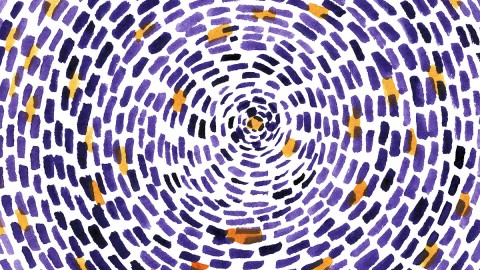Once there was a farmer who discovered that he had lost his watch in the farm.
It was not an ordinary watch because it had sentimental value for him. After searching the hay for a long while, he gave up and call the help of a group of children playing outside the barn. He promised them that, the person who found it, would be rewarded.
Hearing this, the children hurried inside the barn, went through and around the hay but still could not find the watch. Just when the farmer was about to give up looking for his watch, a little boy went up to him and asked to be given another chance. The farmer looked at him and thought, “Why not.? After all, this kid looks sincere enough.” So the farmer sent the little boy back in the barn. After a while the little boy came out with the watch in his hand.
The farmer was happy and surprised and so he asked the boy how he succeeded where the rest had failed.
The boy replied, “I did nothing but sit on the ground and listen. In the silence, I heard the ticking of the watch and just looked for it in that direction”
MESSAGE : A Peaceful mind can think better than a worked up mind. Allow a few minutes of Silence to your mind every day, and see how sharply it helps you to set your life the way you expect it to be.
Give Space
only peaceful mind or silence. Right. But we all are missing here. The farmer who gave space to that little boy. If we also can give space to people around us instead of our suggestions, advice, etc. They will also become silent and motivated to grow.
Also in any circumstances universe give us space to grow, become silent and mature. All the circumstances gives us the resources. Unless we are silent and use our own intelligence we will be able to see what resources are available to us in that moment.
This will give us question: What Is Intelligence? We all are intelligent. But the true Intelligence is only when we Bring Presence into Whatever You Do.
How do you catch yourself from drifting into the past or the future, maybe even avoiding the present moment?
Whenever you get drawn back into the mind and into the future, you’ll notice it because usually you don’t feel so good anymore. You become upset, discontented, irritated, depressed. It means you lost the present moment, you lost the vertical dimension, and you lost awareness of yourself as consciousness. [You’re back to being] a mind-created person with this limited personal history and a mind-created “little me,” the ego. It’s never satisfied for long.
You can only break through to a deeper level of one’s self in the vertical dimension of the present moment. That’s regardless of the circumstances of your life. So many people say, “Oh, if I had more free time, if I didn’t have to worry about my finances, or I didn’t have this or that, I could dedicate all my life to spiritual awakening. Wouldn’t that be great?”
It would not be great, because it’s through the very challenges of daily life that you become more motivated to awaken. You can actually use whatever the circumstances are, and instead of working against them, see if you can align yourself with the present moment internally.
Learning from the story Farmer and Watch: Bring Presence into Whatever You Do
Experience Learning
Staying present, then, means staying here – right here – and there are a few simple steps that can lead us to the experience of profound attention and a direct experience of the moment that we’re in.
1. Take a breath – breath, along with change, is the only constant, and being present starts with the breath. Simply draw a deep breath and let it out through your nose. When we breathe through our mouth it triggers a subtle anxiety response, which increases heart rate and redirects blood flow. A slow release of breath through the nose has the opposite effect of mouth-breathing, and draws a relaxation response.
This technique and intention is also taken in part from the Theraveda Buddhist meditation tradition. Try it out – take a breath and, when you exhale, what happens? Exactly – nothing. In the Theraveda tradition – the oldest of the Buddhist traditions – meditation practitioners are taught to focus on the out-breath because on the out-breath nothing happens. Everything falls away for that simple span of time – a breath.
2. What are you doing right now? – consider, as a correspondence to that moment of suspended breath-time, what you’re doing right at that moment. For most of you, right now, you are reading. Are you just reading? Where are your thoughts? Your emotions? Your hands? Your sense of time? You are reading – that’s it…so, just read.
Not being present is easy. There are bills to pay, and kids to pick up at school. There are doctor’s appointments and reports to write, books to read, parents to resent, loved ones to miss and the list goes on and on. With all that going on – past and future – it’s no wonder that presence is so elusive. It is not, however, as elusive as you might believe.
3. Be a witness – in becoming aware of what you are doing – exactly what you are doing – in any given moment, bear witness to it. Observe it, name it and stand away from it — all at once. The moment is now…now…now…now… When we cling to a “now”, rather than simply bearing witness to it and letting it pass by, we become trapped in time as it passes.
The mind cannot come to rest on a thing – in this case he meant an opponent or a technique or a stance — because then the mind itself becomes trapped by that thing and we, turn, become trapped by the trap. The mind must flow like the breath if we are to remain constantly and consistently present in the moment and not mired in the past or at the sufferance of anticipating the future.
4. Let the rest go – much like bearing witness, or engaging witness consciousness as the wisdom teachings refer to it, whatever is not there in that moment let go. Be there, right there, right then. That’s all.
5. Come back to the breath – when the world or your thoughts begin to again intrude, simply come back to the breath. Inhale, and release your exhale to unbind yourself from the shackles of the past and the anxieties of the future. The constancy of breath can create the constancy of presence for us, if we choose to show up.
The act of being present is, in a sense, a meditation without meditating. The stillness here, though, comes from action – breathing, attending, witnessing, releasing and breathing again. This simple cycle can profoundly change the way that we experience our world.











